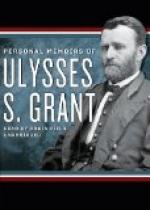The infantry under General Taylor was armed with flint-lock muskets, and paper cartridges charged with powder, buck-shot and ball. At the distance of a few hundred yards a man might fire at you all day without your finding it out. The artillery was generally six-pounder brass guns throwing only solid shot; but General Taylor had with him three or four twelve-pounder howitzers throwing shell, besides his eighteen-pounders before spoken of, that had a long range. This made a powerful armament. The Mexicans were armed about as we were so far as their infantry was concerned, but their artillery only fired solid shot. We had greatly the advantage in this arm.
The artillery was advanced a rod or two in front of the line, and opened fire. The infantry stood at order arms as spectators, watching the effect of our shots upon the enemy, and watching his shots so as to step out of their way. It could be seen that the eighteen-pounders and the howitzers did a great deal of execution. On our side there was little or no loss while we occupied this position. During the battle Major Ringgold, an accomplished and brave artillery officer, was mortally wounded, and Lieutenant Luther, also of the artillery, was struck. During the day several advances were made, and just at dusk it became evident that the Mexicans were falling back. We again advanced, and occupied at the close of the battle substantially the ground held by the enemy at the beginning. In this last move there was a brisk fire upon our troops, and some execution was done. One cannon-ball passed through our ranks, not far from me. It took off the head of an enlisted man, and the under jaw of Captain Page of my regiment, while the splinters from the musket of the killed soldier, and his brains and bones, knocked down two or three others, including one officer, Lieutenant Wallen, —hurting them more or less. Our casualties for the day were nine killed and forty-seven wounded.




